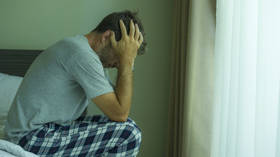As someone battling depression, I know how much the mentally ill are suffering during the Covid-19 lockdown

Suicide remains the biggest killer of men under 45 in the UK. The ‘house arrest’ we’re all under is leaving vulnerable, mentally unwell people alone with their demons.
I start every day with a small cocktail of moderately powerful medication. Quetiapine and amitriptyline washed down with a black coffee. There’s little doubt about breakfast being the most important meal of the day for me, as it literally keeps me sane.
I have struggled with depression for at least 18 months according to my medical records, but in reality, I’m not entirely sure how long the black dog has stalked my life. Before I finally reached the point when I accepted that I needed professional help, I had all too frequent sessions with Doctors Jack Daniels and Johnny Walker. But a series of events in the latter part of 2018 and early 2019 finally made me pull the ripcord and ask for help.
It took me around a week to get an appointment with my GP in London in January of last year. The doctor was unfailingly caring and talked with me for far longer than my allotted 10 minutes, then prescribed me my first round of antidepressants (which turned out not to work). After that I was lucky: through my job, I had private health insurance and was able to get an appointment with a psychiatrist within just over a week. I’m also fortunate to have loving and caring family and friends who supported me throughout. But I am aware this is not the case for everyone, and those people are the most vulnerable.
In pre-corona times, the NHS had an upper waiting time limit of 18 weeks for consultant medical treatment. I know from my experience that had I had to wait this long for proper help, I would have been in very serious trouble. People seeking help for mental health reasons have often waited too long before they ask for it in the first place, if they even do so at all. With the added worry of Covid-19 and the inordinate amount of focus the NHS has placed on battling the virus, waiting times seem certain to rise.
Suicide is the biggest killer of men under 45 in the UK – it is a figure that never fails to shock regardless of how often it is raised. This category is broadly unlikely to suffer serious ill health if they do contract Covid-19, yet keeping them isolated is highly likely to leave them more vulnerable to damaging themselves. In the long list of “avoidable deaths,” surely the young who end their lives by their own hand should be the most avoidable of all.
‘I leaned heavily on the bottle’
Mental ailments like depression and anxiety already cause people to draw in on themselves. In my case, I became uncommunicative with my loved ones. I lived on my own at the time so hiding away was easy (but inadvisable), and I grew more and more introverted and leaned heavily on the bottle.
The evil thing about this sickness is that you need support from friends and family, but you do not feel you deserve any of it, so don’t seek it out. The social distancing and lockdown measures would have made it virtually impossible for me to get any of the support which I am absolutely convinced saved my life.
My consultations have now switched to FaceTime. They aren’t as good as the face to face sessions; conducting them in your own home over the internet still feels like an impersonal way to bare your soul. The consultation room feels like the confessional in a church, a place protected by a sacred bond of confidence. My psychiatrist is telling his patients to embrace the lockdown and to try and regard it as a time for self-reflection that we wouldn’t get in an otherwise busy world.
He told me that we should treat the feelings we get during this moment of crisis in a similar way to the sense of perspective one often gains at a funeral, but rather than letting this feeling just pass away, to try and cling onto it and learn from it when this is all over. Like I say, I was fortunate to have already been in therapy before the lockdown came in, but others were not.
The Samaritans, an organisation that provides help for those in a crisis in the UK, offers a free helpline 24/7 for anyone concerned that they may be about to harm themselves or worse. They tell me they have been as “busy as ever” during this time, answering calls from people in lockdown Britain. Having had to call on them myself once in the past, they are an invaluable service. Mental health charity Mind has also provided a wealth of information for people who may be struggling during the lockdown.
Also on rt.com Western journalists & politicians MOCK Russian doctors driven to suicide by Covid-19 pressures‘The old demons come knocking’
Rather strangely, the only legislative changes that have been made around mental health during the coronavirus outbreak have been to ease the restrictions around sectioning. Being sectioned is a very serious thing as it declares a person mentally incapable and allows for them to be deprived of their liberty and to be forcibly medicated.
It is for this reason that previously three people (usually two doctors and an approved mental health professional) would have to sign off before a person could be sectioned. Under provisions made under the Coronavirus Act 2020 (which passed through Parliament unopposed and with minimal scrutiny), now just one person is required to make this ruling, leaving the system more vulnerable to an abuse of power.
This is not the help that most people having a difficult time need. They need access to proper therapy, not their freedoms taken away. Likewise, friends of mine who rely on AA and NA to keep them off drink and drugs, have said that the inability to go to meetings has seen old demons knocking on their doors.
Younger people are suffering too. According to a survey conducted by employment consultancy firm ERICA, at least 55 percent of Generation Z said they were struggling with their mental health during the lockdown. All members of this group are, at their eldest, in their early 20s and for the most part at very limited risk of serious illness from Covid-19. Is it fair that we compromise the mental health of the young in favour of the physical health of the already old and unhealthy? By its overbearing actions, the UK government seems to have turned this into a needless false dichotomy.
An 18-year-old student named Betty, who, like me, suffers from clinical depression, revealed that on top of her usual mental struggles she now had the added worry of what was going to happen to her education and career prospects.
“I am very uncertain about being able to apply to university or drama schools next year,” Betty said. “My biggest concern right now about my career is that I won’t be able to get the experience that I need to be able to apply to the courses that I want.”
Betty is by no means on her own in this. The same survey showed that nearly three-quarters of young people thought their first choice of career was now at risk, and 60 percent said they would neglect their own happiness and aspirations by remaining in a job they found unsatisfying for fear they might not get another.
And then, at the other end of the spectrum, there is the psychological damage being done to the otherwise healthy old. Loneliness is well known to affect the elderly dreadfully. Old people deprived of the ability to meet friends or grandchildren potentially face the longest isolation so they can be ‘shielded’ to protect their health.
It is at best an odd society and at worst a cruel one that tells its elderly they essentially have a choice between isolation and death. Professor Sucharit Bhakdi of Mainz University in Germany is particularly concerned about the wellbeing of otherwise healthy old people. He fears that this lack of stimulation will lead them to suffer and possibly even impact their health in worse ways than the virus.
Large scale studies conducted by Brigham Young University in Utah show that by far and away the two most important factors in increasing longevity are close relationships and social integration. Our current methods make both of these factors virtually impossible.
Also on rt.com Anti-social distancing: The darker side of a remote world, from execution orders to digital governance‘I’d rather break my leg and arm’
Covid-19 has frequently been described as an “invisible enemy” by politicians during this pandemic, but mental illness is a yet more invisible illness that was threatening lives long before coronavirus ripped through the world and will continue to do so long after the virus has been brought under control.
People need real help, not stories about how ‘difficult’ Hollywood celebrities are finding being cooped up in their mansions. Aside from being ridiculous and unrelatable, this perpetuates an abhorrent misconception that depression is in some way glamourous. It isn’t glamorous and it isn’t something that makes you ‘interesting’. It is a disease that needs proper treatment.
In my time, I have broken my leg and my arm through a couple of sporting misadventures, and I can honestly say I’d break both again simultaneously if it meant never having to face depression again.
While isolation may spare people from Covid-19, there are other, far worse things that it could cause. If we are truly all in this together, then that means the mentally ill need to be cared for just as much as those hit by physical illness, not condemned to battling their thoughts alone.
If you like this story, share it with a friend!
The statements, views and opinions expressed in this column are solely those of the author and do not necessarily represent those of RT.














